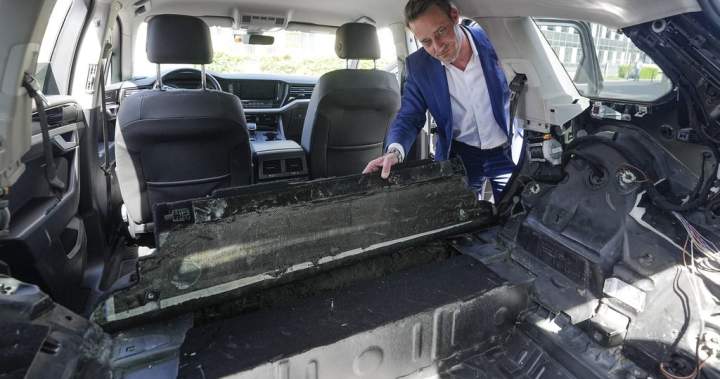Interior and security ministers from Canada and the other Group of Seven countries are pledging to work together to aggressively fight transnational organized crime.
Wrapping up a two-day meeting in Ottawa, the G7 ministers said Sunday they were committed to disrupting the ability of global crime groups to finance and profit from their heinous activities.
In a joint statement, the ministers said transnational criminal organizations are “ruthless in their pursuit of profit, power and influence” through corruption, violence and other illicit means.
“Fighting them requires both a shared global understanding and commitment to co-operation.”
The statement adds that G7 countries recognize the need for “innovative approaches” to address organized crime threats, including use of measures employed in other fields — such as counterterrorism and cybersecurity — where appropriate.
Public Safety Minister Gary Anandasangaree said there is a confluence of transnational organized crime activity with terrorism, cyberattacks and exploitation of migrants.
“This is all coming together in more of a centralized set of challenges, which law enforcement have not dealt with in the past,” he told media after the meetings.

Get daily National news
Get the day’s top news, political, economic, and current affairs headlines, delivered to your inbox once a day.
“So our expectation is to increasingly work across the different lines, to ensure that we’re looking at these situations in a holistic way and to address them by connecting the dots.”
The G7, an informal grouping of leading economies, includes Canada, France, Germany, Italy, Japan, the United Kingdom and the United States, as well as the European Union.
Magnus Brunner, the European commissioner for internal affairs and migration, said organized criminal groups have become more sophisticated and global in their reach.
Brunner said in an interview that fighting criminal organizations involved in the lucrative criminal drug trade means “we have to co-operate on an international basis — share data, share information and share policies as well.”
Donald Trump’s White House has expressed concern about the southbound flow of fentanyl into the United States — criticism it has used to justify tariffs against Canada.
Anandasangaree said he had good conversations with the U.S. representatives at the G7 meetings, Attorney General Pam Bondi and Rob Law, an undersecretary with the Department of Homeland Security, including mention of Canada’s efforts to bolster border security through new spending and legislation.
“We didn’t get into the trade discussions at this point, because this is not within my purview,” Anandasangaree said.
In their statement, the G7 ministers reaffirmed a commitment to detecting and disrupting the production, trafficking and distribution of illegal synthetic drugs including opioids like fentanyl and their precursor chemicals.
Participants at the meetings also examined the problems of migrant smuggling and the intimidation of diaspora communities by authoritarian states.
In addition, they discussed tactics to deal with the online challenges of terrorist and violent extremist content, cybercrime and the internet-related dimensions of child sexual exploitation and abuse.
© 2025 The Canadian Press
Canada, G7 security ministers pledge to fight organized crime together





